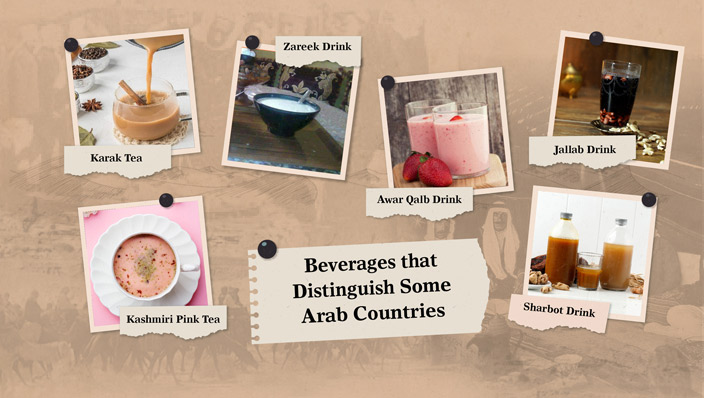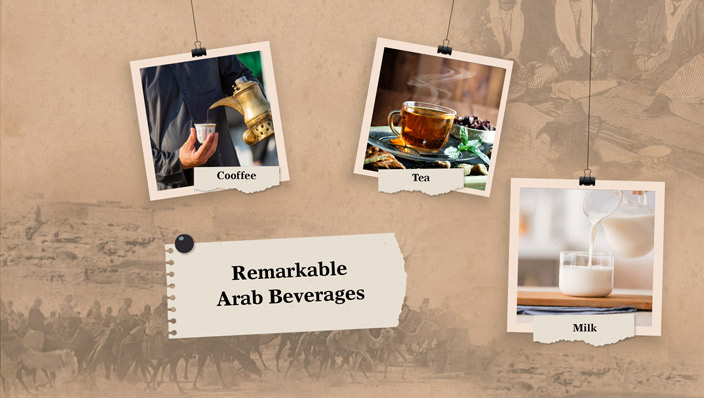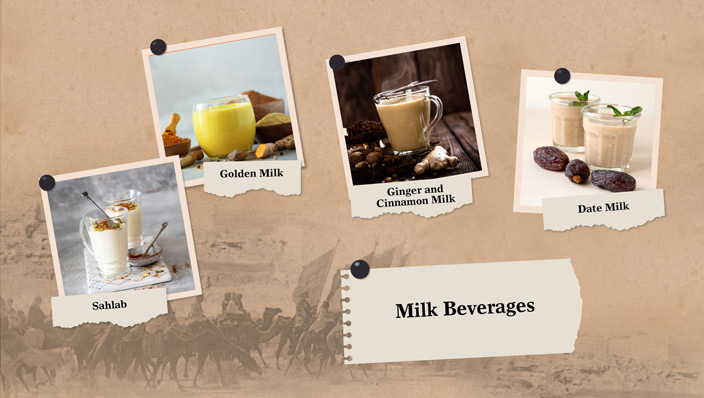 Recipes
Recipes
 Recipes
Recipes
While the world varies in its development and progress, fundamental elements of cultures remain integral to their identity. Among these lively and ancient elements are traditional beverages, carrying the imprints of time and ancestral experiences. They are not merely drinks but fragments of a rich cultural heritage, taking tastes on an enchanting journey through time and space.
From Arabica coffee to contemporary drinks inspired by heritage, we'll explore the magic world of Arabian beverages. Our journey will take us to a world of authentic tastes and mind-blowing experiences, showcasing the way Arabian beverages delight our senses in unforgettable ways.
In the Arab world, there are many different types of drinks. Although shapes and flavors differ from one country to another, the authentic Arabian character remains distinct in preparation methods and taste.
Come along on a journey to discover some of the most popular Arabian beverages.
Index:
The Arab history of hospitality.
Beverages distinguishing some Arab countries.
The most famous Arab beverages.
Milk beverages.
Conclusion.
The Arab History of Hospitality:
Hospitality has played a pivotal role in Arab life since ancient times. Their lives were primarily centered around travel activities, often taking considerable time, relying on walking or animal journeys in the best conditions. During that era, when hotels or rest places were not common, travelers began inventing their hospitality, perfecting it in a way that represented their customs and traditions reflecting Arab values such as generosity, chivalry, and good reception. Arab coffee served as an ambassador expressing the warmth of reception in Arab gatherings, evolving in its forms and flavors over time. Other beverages emerged to claim a distinguished position in Arab hospitality, and we'll explore some of them in the coming paragraphs.
Arabian Coffee (Gahwa):
Undoubtedly, coffee is one of the most famous beverages with great popularity in the Arab world. It has been closely associated with Arab gatherings, hospitality, and culture for generations, embedding itself into their daily lives and enhancing the values of authenticity, generosity, and pride in hospitality. The Arab coffee, with its rich flavor and aroma, has been organized in Arabic poetry and verses, not only because of its close connection with gatherings and occasions but because it formed a rich history of Arab hospitality in various ways:
Hospitality Tradition of Coffee: For centuries, Arabs have been accustomed to welcoming guests with the finest Arabica coffee. This tradition reflects the generosity of hospitality and care for the comfort of visitors. Coffee is offered gently and in a skillful manner.
Welcoming and warm atmosphere: To create a welcoming and warm atmosphere, Arabic coffee cups are often served with dates or delicious Arabic sweets
as part of the welcome and warmth provided to guests.
Enhancing Social Bonds: Hospitality coffee encourages sitting and conversing quietly and comfortably with guests. These moments strengthen social bonds, cultural exchange, and story sharing.
Authenticity and Heritage: Arabica coffee and its presentation are considered part of the authenticity and cultural heritage of Arabs. These beverages carry a long history of respect for traditions and social values.
Unique Experience: Hospitality coffee provides guests with a unique experience. The luxurious flavor and fragrance of Arabic coffee reflect the Arabs' attention to their hospitality.
Social Element and Communication: Hospitality coffee encourages communication and conversation among guests, aiding in fostering social culture and the exchange of experiences and stories.
Symbol of Generosity and Courage: In some Arab cultures, offering Arabica coffee is considered a symbol of generosity and courage. Arab hospitality deals with guests with the utmost generosity and chivalry.
In these ways, Arabica coffee played a crucial role in enriching the Arabian hospitality experience and enhancing communication and solidarity among people.
Beverages that Distinguish Some Arab Countries:
While Gahwa holds a prominent place in Arab hospitality, each country has its unique culture reflected in the features of its hospitality. There are many foods and drinks shared in Arab hospitality from the ocean to the Gulf. However, some are associated with specific Arab countries, gaining popularity in those regions. For example:
Jallab Drink:
One of the most famous beverages in the UAE, extending its popularity to other Middle Eastern countries, particularly during the Ramadan month.
Prepared using four main ingredients: rose water, grape molasses, dates, and raisins, with ice added according to preference to overcome the heat. Additional ingredients like pine nuts and almond slices can be included.
Awar Qalb Drink:
Widely known in Kuwait and Saudi Arabia, with its original origin traced back to Kuwait.
The reason behind the name is not precisely known. Still, it is likely associated with the Gulf Arabic expression "Awar Qalb," a metaphorical term meaning heartache resulting from the shock of its taste, signifying the exquisite flavor that overwhelms the heart.
Prepared using frozen fruits (mango and strawberry), ice cream, and sorbets. Other ingredients like banana, milk, ground almonds, vanilla, nuts, and raisins can be added.
Sharbot Drink:
A well-known beverage in Sudan, traditionally consumed by the Nubians for thousands of years.
Prepared year-round for celebrations and occasions, but more closely associated with the Eid al-Adha season.
Made from dates, ginger, cardamom, cinnamon, and fenugreek are added. It is sometimes fermented and may include additional ingredients such as apple, fresh grape juice, raisins, and yeast.
Zareek Drink:
One of the most famous desert beverages in several countries, notably in Morocco.
Its use in hospitality is a sign of genuine welcome and warm reception of guests.
Prepared using milk, a small amount of water, and sugar. In some places, other ingredients like cocoa, yogurt, almonds, sesame, and hazelnuts can be added.
Karak Tea:
It is popular in many Gulf countries and widely loved.
Originally from India, known as Adeni tea in Yemen.
Has various health benefits related to combating cancer cell growth and regulating heartbeats.
Prepared using cardamom, cloves, cinnamon, ginger, and milk.
Kashmiri Pink Tea:
Widely popular in the Arabian Gulf region.
First originated in Kashmir, Pakistan, known as Noon Chai or Sheer Chai.
Prepared using milk, anise, cardamom, saffron, cinnamon, chopped almonds, and whole tea leaves.

Remarkable Arab Beverages:
Despite the differences in customs and traditions among Arab peoples regarding hospitality, there are some beverages considered integral to Arab cultural roots and hospitality. Some of the most prominent include:
Tea:
Tea remains a constant presence in global hospitality. It is the most consumed beverage worldwide and extremely popular in the Arab world. Saudi Arabia and Kuwait lead in tea consumption, averaging 1.2 kilograms per person annually, followed by Morocco and Egypt with an average of 1 kilogram per person annually.
Milk:
Milk has always been a prominent element in Arab hospitality, even before coffee took the spotlight. Despite that, milk still holds its special place in many Arab countries, appreciated for its numerous health benefits. It is used in the preparation of various beloved recipes for both adults and children.

Milk Beverages:
Milk plays a central role in preparing many cold and hot beverages. Arabs have excelled over time in creating various recipes using milk. Notable among them are:
Date milk: A beloved beverage for all age groups, consumed in the morning by placing dates in a cup of warm milk to promote health and activity.
Ginger and cinnamon milk: A good choice for boosting immunity, adding two tablespoons of grated ginger with a sprinkle of cinnamon has a positive effect on strengthening the immune system and protecting the heart, arteries, and blood vessels.
Golden milk: Also known as turmeric milk, this Indian-origin beverage has recently found its way to Arab tables due to its amazing health benefits, such as improving brain function, memory, and overall mood. It mainly consists of milk, turmeric, and ginger, and may include other ingredients like honey, black pepper, and coconut oil.

Sahlab:
This beverage tops the list of the most popular drinks in Egypt and the Arabian Gulf. Milk is a key component in preparing Sahlab, which can be served either as decorated dishes with pistachios or as a hot drink with added vanilla, raisins, and various types of nuts. Cinnamon or mastic gum can also be added.
- Hospitality is a deep-rooted tradition and culture in the Arab world.
- Some beverages are shared by Arabs across different countries, while others are associated with specific nations.
- Jallab, Karak Tea, Sahlab, and Date Milk are beverages linked to multiple Arab countries.
- Sharbot, Zareek, and Awar Qalb are drinks belonging to specific Arab countries (Sudan, Morocco, and Kuwait).
- Coffee and tea always top the list of the most popular beverages in the Arab homeland.
- Milk remains a fundamental element in Arab hospitality, contributing to various beloved hot and cold drinks.